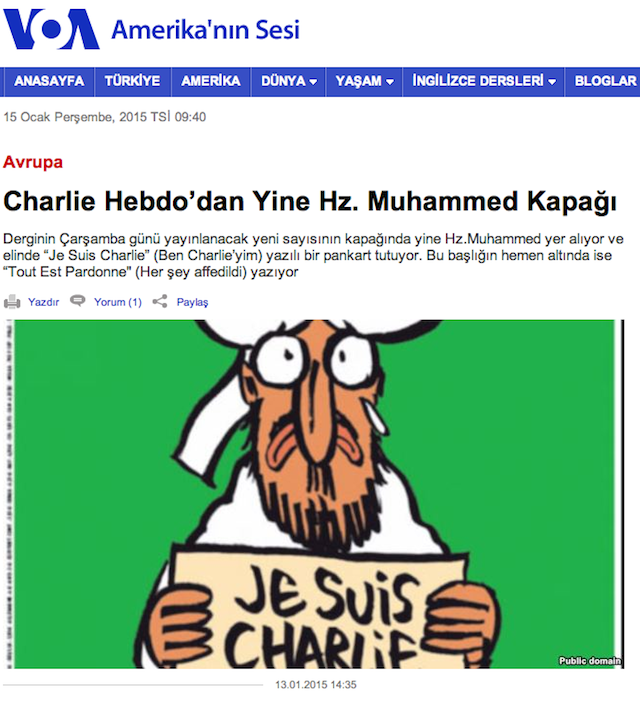BBG Watch Commentary
In a display of independence and journalistic courage, the Turkish Service of the Voice of America (VOA) ignored the management’s ban on showing the cover of the latest edition of Charlie Hebdo to predominately Muslim audiences.
The VOA Turkish Service not only ignored this specific ban issued by the Voice of America management, but it also ignored another management directive which said that “The actual photo, embedded as an infographic in the page, will be on an all-black background with white text saying ‘WARNING: This image may offend some viewers. Please click if you wish to see it’.”
The service did not cover the photo with a black burka as VOA English Service and the vast majority of other VOA services did.
The VOA Turkish Service did what any journalist who takes his or her profession seriously and respects the VOA Charter and American values should have done.
We would not advocate posting just any insulting Charlie Hebdo cartoon simply to prove a point, but the magazine’s latest cover was clearly in the news.
Compared to other Charlie Hebdo images, the latest cover cartoon was not particularly offensive unless a person simply objects to any depiction of the prophet Muhammad. Most Americans would not find it offensive at all.
Most major American media outlets have shown the cover, with the notable exception of The New York Times and NPR (shame on them) and just a few others. The Washington Post was among many mainstream American newspapers which have decided that they have an obligation to provide this news content for their readers who can decide for themselves whether they want to glare at it or simply move on to another page.
We believe that the the VOA management’s ban on showing the Charlie Hebdo cover to predominately Muslim audiences, as well as the ban on showing it on VOA TV and in videos, seriously distorts for foreign audiences the reality of American life and society. It presents to the world an image of the response of the majority of U.S. media and the vast majority of Americans that is false or at least highly misleading.
The VOA Charter was supposed to guard against censorship of news and such management decisions, but it was ignored in this case. In our view, the VOA management was clearly guilty of censorship. It was an unfortunate and wrong decision for a news organization that claims to be highly supportive of independent journalism and press freedom. VOA management has been encouraging self-censorship and violating the VOA Charter by removing news and any politically controversial content from programs designed for placement on local stations in countries where such placement would not be possible if VOA programs included news and uncensored information.
We have learned that initially at least some senior VOA executives and managers wanted to show the cartoon without any major restrictions, but that decision was later changed. We could not determine whether it was changed due to some kind of special intervention from other elements of the U.S. administration, such as the State Department or the White House, or whether one of the key VOA executives made the final decision on his own to ban the showing of the cartoon for VOA TV and video audiences and for all VOA audiences in Muslim countries. In any case, VOA executives have not shown much independence or journalistic courage.
We were also not able to determine whether the Turkish Service cleared with the VOA senior management their unrestricted showing of the cartoon. But the service behaved like all courageous journalists who take their job seriously should. They deserve our admiration for their courage and our support.


Comments are closed.